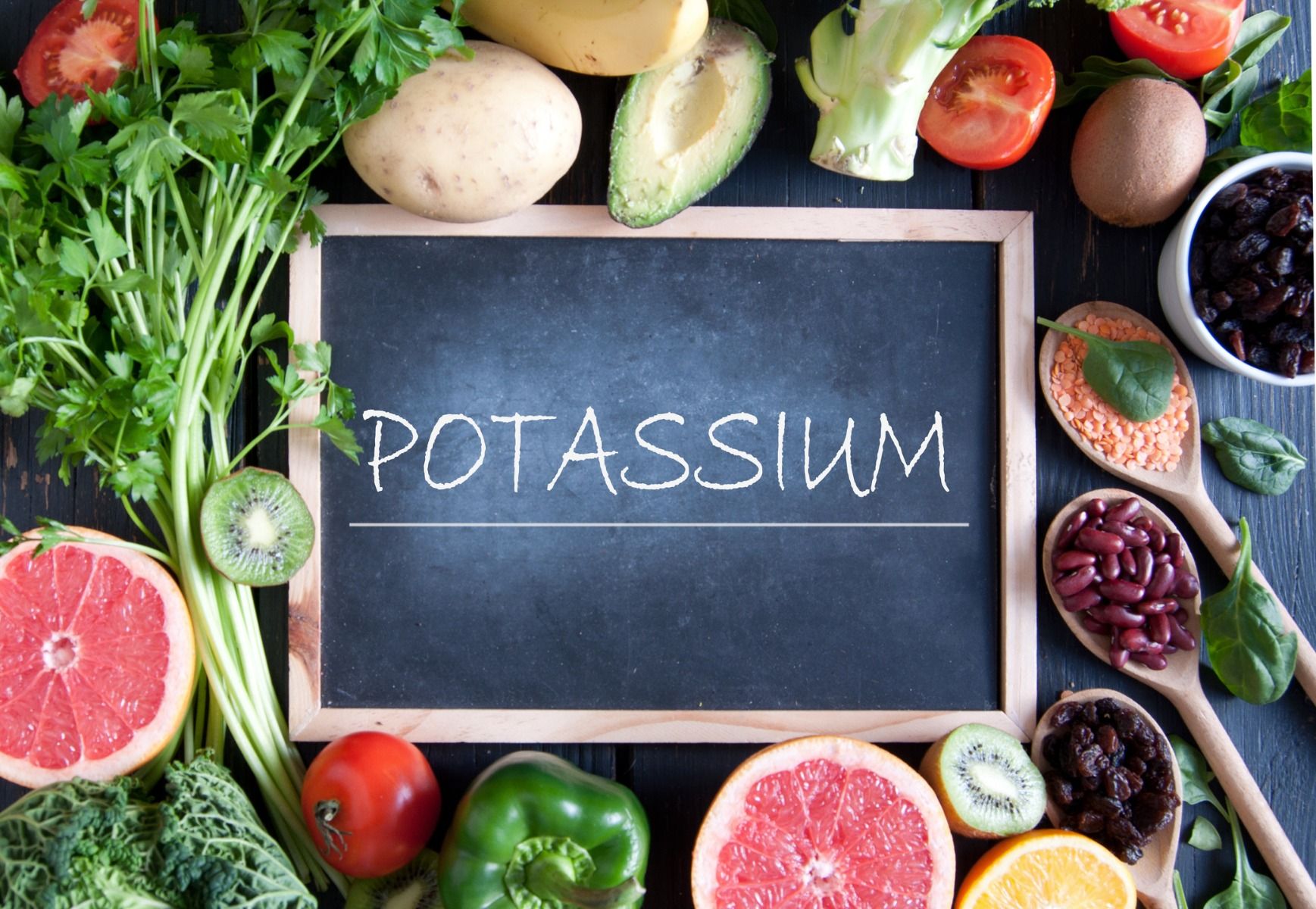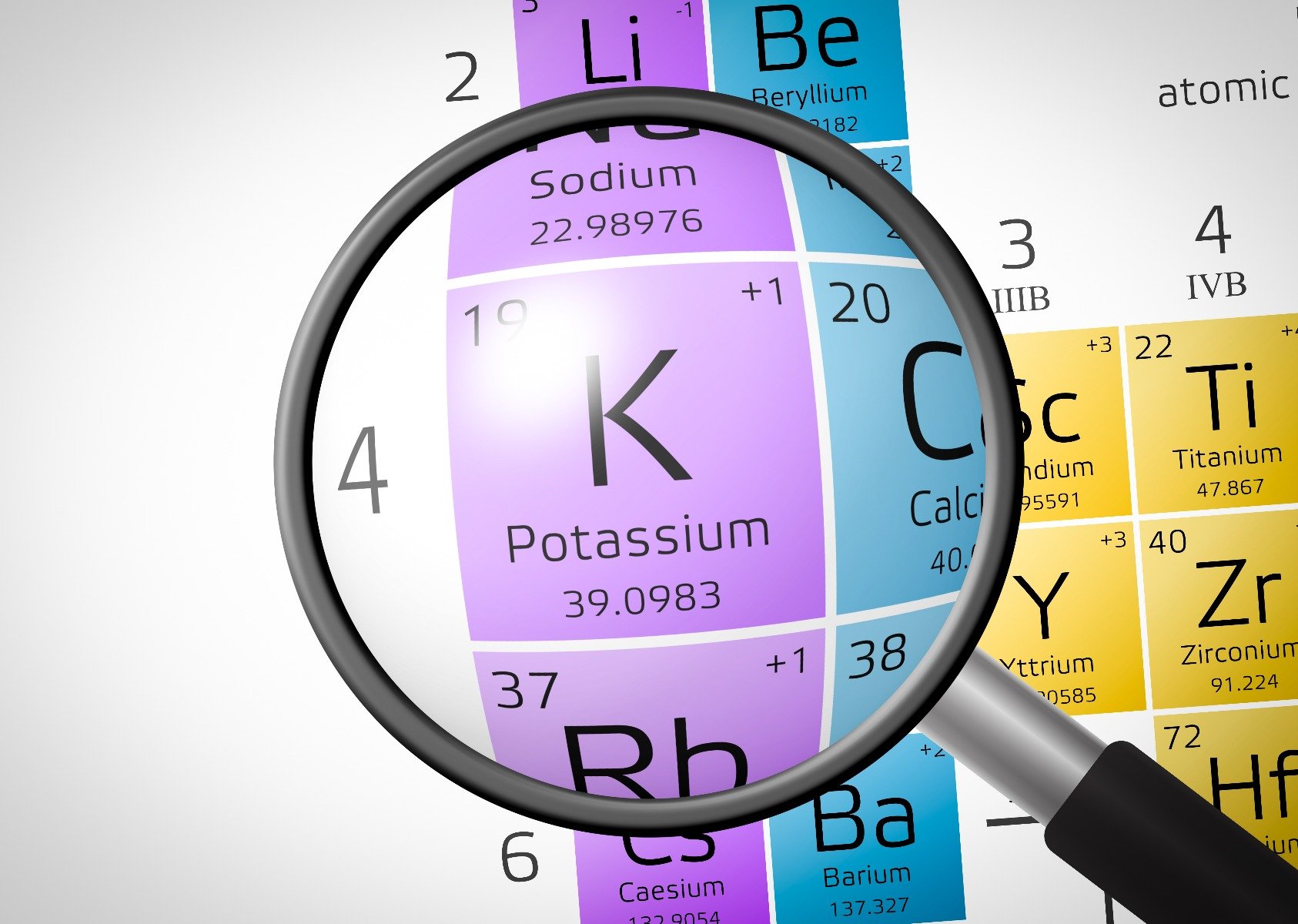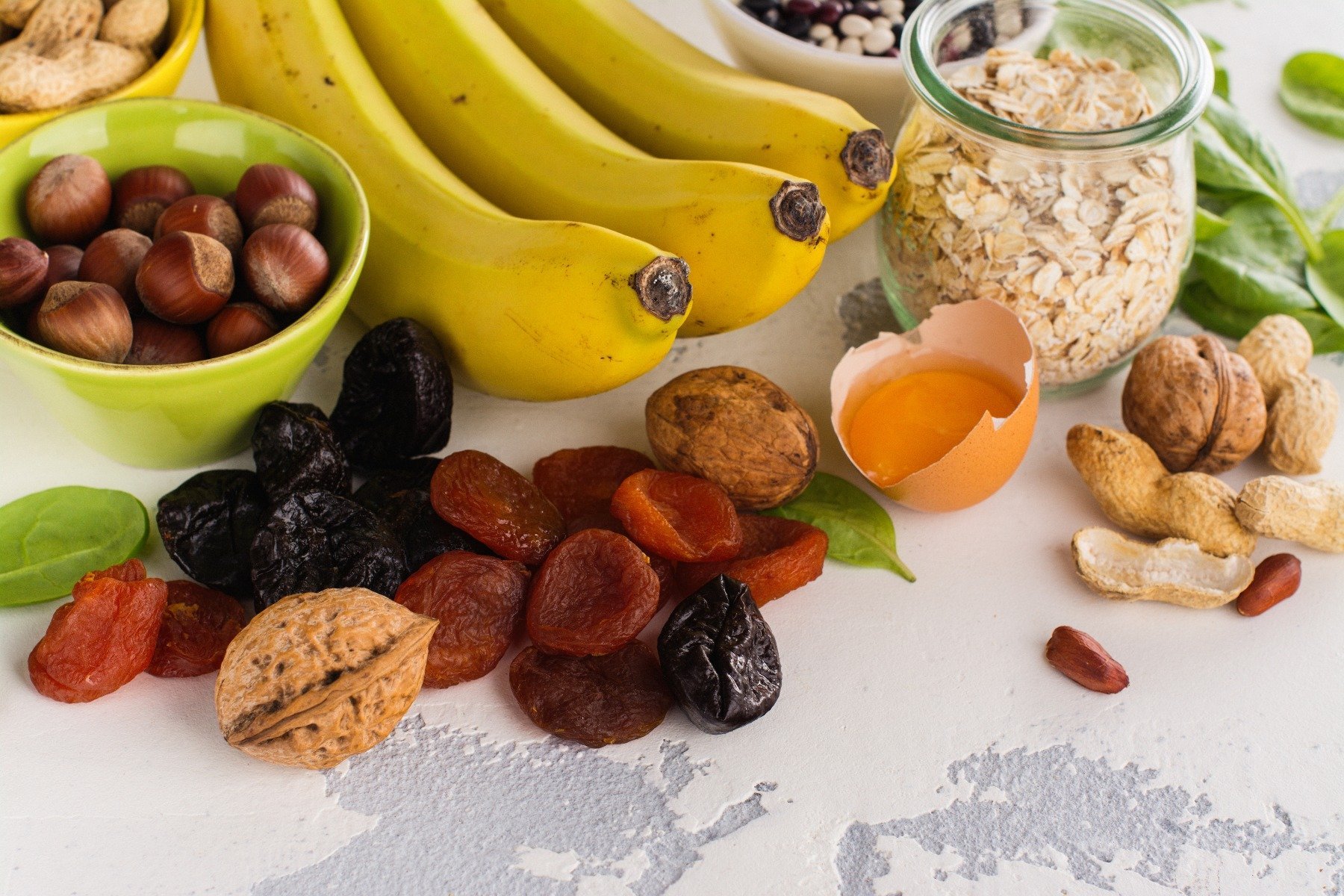Table of Contents
Healthy lifestyle is rarely associated with supplementation of mineral potassium. It is the main essence without which the human body can not function properly. Find out more about suprising effects of potassium to prevent healthy issues caused by potassium deficiency.
Potassium and its functions in the body
Potassium is essential mineral which is basic element for the proper functioning of all the cells and tissues in the humany body. It affects the heart muscle but also skeletal and smooth muscles which participate in neuromuscular transmission.
In the human body potassium is found as a cation. The organism contains about 98% of potassium directly in the cell and the remaining 2% are present outside the cell. Overall, it is situated mainly in muscles, red blood cells, liver, skin, bones, nerves, brain or body fluids. [3]

Absorption of potassium happens in the intestines and it is excreted in the urine and partially also in the faces. The among of potassium which we excreted, depends on the amount of this received element. People who do not receive potassium in the diet or supplements, have drastically reduced amount of potassium in their urine. Particular care should be taken by athletes because warning up the body and then sweating during the training leaders to increased loss of potassium. It is therefore recommended to athletes to increase the income of potassium. [4]
Human body requires at least 1000 mg of potassium per day to ensure all the key processes. We can supplement it with fruits, vegetables, legumes or some fishes. Given the current style of eating, it is common that people suffer from potassium deficiency which can be also life-threatening [1]

The most important effects of potassium
Potassium and sodium form equilibrium system in the human body which controls the management of water in tissues and it contributes to the proper functioning of the kidneys. Except this benefit, potassium has a large number of other health benefits.
1. It reduces blood pressure and risk of cardiovascular diseases
Sodium is mainly responsible for the correct balance of potassium. Little potassium and a lot of sodium can cause high blood pressure. That is why it is important to combine increased consumption of potassium together with lower consumption of sodium in order to prevent cardiovascular diseases. Hypertension affects up to 95 % patients. Studies have shown that potassium supplementation can significantly reduce blood pressure in people fighting with hypertension who also consume a lot of sodium. [6]
Up to 38 % patients with hypertension who were on diet with high content of potassium, had blood pressure under control without need of treatment. [7]
Reduction of the risk of cardiovascular diseases was also researched by a study on the group of people who daily received 4 g of potassium. The result was up to 49 % less risk of death from ischemic heart disease than the group who daily received only 1 g of potassium. [5]
2. It maintains healthy bones and muscles
Food rich with potassium maintain an alkaline environment in the body as opposed to acidosis. Metabolic acidosis is caused by a diet full of acidifying foods such as meat, dairy products and processed cereal grains. Acidosis or disorder of internal homeostasis is a common result of a typically acidic Western diet. [1] [18]
Acidosis can cause nitrogen excretion and thus loss of mineral density of bones and muscles. Eating with a higher content of potassium helps to protect muscle mass in the elderly as well as in patients with diabetic ketosis which tends to lead to muscle loss. Potassium can be a suitable prevention of this disease. [18]
An example of this is also the study where postmenopausal women suffering from osteoporosis have been taking potassium for a year. The research resulted in a decrease in some biomarkers of bone turnover. This shows the protective effect of potassium on mineral bone density. [9] Concerning the importance of potassium for muscles, one study found that participants taking 5,266 mg of potassium daily maintained an average of 1,6 kg lean tissue mass higher than those with 50% lower income of potassium. [10]
You might be interested in these products:
3. It protects the kidneys and reduces the risk of kidney bones
The researchers investigated the effects of potassium in hypertensive rats. Higher doses of potassium have been shown to be effective in protecting the kidneys after stroke as compared to the group with the lower income of potassium. This effect did not affect blood pressure. [12] Income of potassium can prevent kidney inflammation. Especially in combination with magnesium,it helps against kidney damages by cyclosporins, substances which side effect is kidney failure. [13] [14]
Kidney stones are formed when urine contains a high concentration of calcium. As mentioned above, income of potassium reduces the amount of calcium in the urine and can prevent the formation of kidney stones. Studies have also confirmed this. In women who received higher amounts of potassium, the possibility of kidney stones was reduced by up to 35%. Income of potassium in the form of potassium citrate even reduces the occurrence of repeated kidney stones [11]

4. It helps as prevention against stroke and vascular attacks
People who consume daily 3 to 5 servings of fruits and vegetables with high content of potassium can reduce the risk of stroke and vascular attacks by up to 26% compared to those who eat less than 3 servings. The reason is the effect of received potassium from fruits and vegetables on blood pressure in combination with dietary fiber. [16] [19] The main risk factor in stroke is high blood pressure. One study has followed Americans over 12 years. An increase of potassium of 390 mg per day was associated with a 40% lower stroke mortality in adults aged 50-79 years. [17]
Potential protective effects of potassium have been demonstrated by investigating its effects on the prevention of the stroke. Studies showed 21 % reduction in stroke with an increase in income of potassium of 1,64 g per day. [23]

5. It helps to prevent diabetes
Diabetes who acquire diabetes throughout their lives, have much bigger problems with liver than with pancreas. And it is potassium that affects the proper functioning of the liver. If a person has a low potassium level, he cannot store sugar where it need to be – in the muscles and the liver. A body without potassium turns sugar into fat. After this process, the sugar level drops again and the body requires additional sugar. Although the body is eager to take more sugar, it actually lacks potassium. Indeed, low levels of this mineral reduce glucose tolerance associated with reduced insulin release, leading to significant changes in glucose metabolism. [21] [22]
Studies also sho that high income of potassium is associated with 39 % reduction of the risk of metabolic syndrome in both men and woman. [20]
Why is potassium important for athletes?
During exercise a significant amount of potassium is excreted by sweating. The more intense training you have, the more potassium you sweat. So if you train for more than an hour a day or you do endurance sports such as cycling or running, make sure to pay attention. [28] Potassium may have the following benefits for you:
1. It helps to prevent inflation and water retention
Excessive amount of sodium in the diet results in water retention in the body and associated inflation. It is potassium that is the key in prevention of this. Immediately after consumption, sodium and water are together absorbed into the cells. The water is then deposited in the body, exactly between muscles and skin which cause inflation. Remembers how you felt after your last fast food or salty food. Potassium is ideal solution to this problem. [27]
Supplementation of potassium affects the balance of electrolyte. That means that potassium expels sodium and water from cells using an electrolytic pump. As a result, sodium and water are excreted in the urine and the balance of internal environment is created. This benefit is especially praised by athletes because it solves the problem with inflated abdomen and water retention. [27]

2. It affects the overall functioning of the muscles
Different concentrations of potassium and sodium inside and outside the cells create electrical charges that help nerves send signals to the brain. Thanks to them we can move the muscles. In this way, potassium affects the contraction and relaxation of muscles, which allows our body to train. In addition, it helps in muscle regeneration and prevents muscle cramps. [30]
3. It is used in the breakdown of glycogen
Potassium is part of the process of breaking down glycogen in muscle cells, which provides cells with energy during endurance training. When glycogen disintegrates, the cells in the muscles deplete the potassium that reaches the bloodstream or leaves the body by urination or sweating. [31] Income of potassium after hard training is more than necessary. Many athletes therefore eat a banana after the training, one of the major sources of the potassium. This complements level of potassium and at the same time it promotes muscle growth, strengthen immunity and firm bones. [28]

The best food sources of potassium
Mainly the unprocessed foods are rich natural source of potassium. In fruit, it is especially apricots, avocado, bananas, melon, figs, grapefruit, kiwi, mango and citrus. In vegetable, it is especially green and leafy vegetables such as spinach, cabbage, salad or broccoli. Other sources are artichokes, bamboo shoots, pulses such as beans, lentils, peas, but also bran and chocolate. [15]
The presence of potassium in the amount of 100 g per foods can be found in the table. [2]
| Food | Amounts of potassium per 100 g |
|---|---|
| Bananas | 350 mg |
| Wheat bran | 1160 mg |
| Soya | 1660 mg |
| Boiled eggs | 180 mg |
| Unprocessed apricots | 1880 mg |
| Unprocessed figs | 1010 mg |
| Dried peaches | 1100 mg |
| Dried raising | 860 mg |
| Chicken meat | 300 mg |
| Pistachios | 970 mg |
| Milk chocolate | 420 mg |
| Bamboo shoots | 535 mg |
| Parsley | 1080 mg |
| Curry | 1840 mg |
Recommended income of potassium
The daily income of potassium should be at least 2 g per day in adults and healthy individuals. However, the optimal potassium income is up to 4,7 g per day, while breastfeeding even 5,1 g. Higher income of potassium should be considered by people suffering from diabetes, hypertension or liver disorders in consultation with a doctor. [1] The required dose of potassium based on the age, sex and life stage can be found in the table. [24]
| Age | Men | Women | Pregnancy | Breastfeeding |
|---|---|---|---|---|
| Up to 6 months | 400 mg | 400 mg | ||
| 7 – 12 months | 700 mg | 700 mg | ||
| 1 – 3 years | 3000 mg | 3000 mg | ||
| 4 – 8 years | 3800 mg | 3800 mg | ||
| 9 – 13 years | 4500 mg | 4500 mg | ||
| 14 – 18 years | 4700 mg | 4700 mg | 4700 mg | 5100 mg |
| 19 – 50 years | 4700 mg | 4700 mg | 4700 mg | 5100 mg |
| 51+ years | 4700 mg | 4700 mg |
Research in the United States has shown that less than 2% of Americans receive enough potassium, while women consuming even less of this element than men. [1] A study on Slovaks of different sex and age confirmed low levels of potassium in the body in the elderly. Results also fluctuated based on the physical activity of the participants. [25]
If you can not take the recommended dose of potassium as a diet, you should take the appropriate dietary supplement. Risk groups are people with low consumption of fruit and vegetables, seniors, alcoholics, athletes and people who have a lot of physical stress.
Also if you are on a weight loss diet with less then 1000 calories per day, you are at risk of potassium deficiency and you should think of supplementing it with supplements.

Potassium deficiency
Long-term decreased levels of potassium in the body cause hypokalaemia which results from excessive excretion of potassium from the body and insufficient supplementation. It particularly affects:
- athletes who train more than an hour a day
- people no a low calories diet
- everyone with digestive problem and diarrhea
- people with eating disorders
- diabetics
- people with kidneys diseases
- alcoholics
Hypokalaemia is the body´s response to frequent urination, sweating, diarrhea or vomiting in which a lot of this mineral is washed out of the body. Potassium deficiency begins to show symptoms such as:
- swelling
- hypertension
- heart rhythm disorders
- arthritis
- nervousness
- increased fatigue
- muscle weakness
- constipation
Hypokalaemia can be detected by blood tests. If the potassium level drops to 2.2 – 2.5 mil. / liter, it is a life-threatening condition that can cause paralysis of the body, muscle breakdown, breathing problems and even fatal heart rhythm disorders. [18] [25] The positive effects of potassium and the negative consequences of potassium deficiency are the reason why we need to monitor and regularly replenish the level of potassium.

Excessive income of potassium
Excessive level of potassium in the body is called hyperkalaemia and can lead to severe and significant metabolic disorders. This is a situation where the potassium level rapidly rises to 5,3 to 8 mil. per liter, with an optimum limit of 3.6 to 5,2 mil. per liter. A slight increase begins to show as:
- muscle pain
- fatigue
- nausea
- tingling in the limbs
Low pressure, heart rhythm disorders, at worst to cardiac arrest are considered to be serious symptoms of hyperkalaemia. However you do not have to worry. By income of fruits, vegetables and optimal amount of supplements, you can not take too much potassium. Hyperkalaemia occurs only in people with renal impairment or diabetics. Extreme potassium intake in healthy individuals tends to induce vomiting or excretion of excess potassium in the urine. [26]

Practical example how to increase the income of potassium
In order to receive enough potassium, it is advisable to limit the income of sodium, especially in the amount of consumed salt. [4] Another good step is to consume potassium-rich vegetables as a supplement to the main meal, for example, to replace rice with broccoli. It is important to add enough vegetables and fruit to the diet. Try to take apricots, dried raising, nuts or salad for tea time or snack time. A suitable alternative is a serving of fruit or vegetables in the form of a smoothie. How to prepare healthy and nutritious smoothie, read our article 6 smoothie mistakes that make you gain weight. If you are not able to plan your diet in advance and prepare a daily dose of potassium in the form of food, be sure to takepotassium pills. It will help your bones, muscles and it can protect you from more serious cardiovascular diseases.
Do you take care about sufficient income of potassium, too? Leave a comment and tell us in which form you use the potassium the most often. If you did not know about effects of potassium and you would like to share it with your friends and family, feel free to share this article.
[1] Summary of Potassium, primary information, benefits, effects, and Importan Facts – https://examine.com/supplements/potassium/
[2] Potassium intake – http://apjcn.nhri.org.tw/server/info/books-phds/books/foodfacts/html/data/data5b.html
[3] Joe Cohen - Top 14 health benefits of potassium – https://www.selfhacked.com/blog/potassium/#Health_Benefits_of_Potassium
[4] Jacob Farr - Potassium: You make my heart Beat – https://www.foodinsight.org/potassium-ingredient-benefits-health
[5] Rodriguez CJ, Bibbins - Domingo, Jin Z, Daviglus ML, Goff DC Jr, Jacobs DR Jr. - Association of sodium and potassium intake with left ventriculat mass: coronary artery risk dvelopment in young adults. – https://www.ncbi.nlm.nih.gov/pubmed/21788603
[6] Tobian L - Dietary sodium chloride and potassium have effects on the pathoúhysiology of gypertension in humans and animals – https://academic.oup.com/ajcn/article/65/2/606S/4655379
[7] Siani A, Strazzullo P, Giacco A, Pacioni D, Celentano E, Mancini M - Increasing the dietary potassium intake reduces the need for antihypertensive medication. – https://www.ncbi.nlm.nih.gov/pubmed/1929022
[8] Lemann J Jr, Pleuss JA, Gray RW, Hoffmann RG - Potassium administration reduces and potassium deprivation increases urinary calcium excretion in healthy adults. – https://www.ncbi.nlm.nih.gov/pubmed/1648646/
[9] Gregory NS, Kumar R, Stein EM, Alexander E, Christos P, Bockman RS, Rodman JS - Potassium citrate decreases bone resorption in postmenopausal wone with osteopenia: a randomized, double-blind clinical trial. – https://www.ncbi.nlm.nih.gov/pubmed/26401577
[10] Dawson-Hughes B, Harris SS, Ceglia L - Alkaline diets favor lean tissue mass in older adults. – https://www.ncbi.nlm.nih.gov/pubmed/18326605
[11] Curhan GC, Willett WC, Rimm EB, Stampfer MJ - A prospective study of dietary calcium and other nutrients and the risk of symptomatic kidney stones. – https://www.ncbi.nlm.nih.gov/pubmed/8441427/
[12] Tobian L. - High-potassium diets markedly protect against stroke deaths and kidney disease in hypertensive rats, an echo from prehistoric days. – https://www.ncbi.nlm.nih.gov/pubmed/3464706/
[13] Liu DT, Wang MX, Kincaid-Smith P, Whitworth JA. - The effects of dietary potassium on vascular and glomerular lesions in hypertensive rats. – https://www.ncbi.nlm.nih.gov/pubmed/7920452
[14] Pere AK, Lindgren Leena, Tuomainen P., Krogerus L., Rauhala P., Laakso J., Karppanen H., Vaúaatalo H., Mervaala MA. - Dietary potassium and magnesium supplementation in cyclosporine-induced hypertension and nephrotoxicity. – https://www.sciencedirect.com/science/article/pii/S0085253815473624
[15] Brain Miller - 15 foods that are high in potassium – https://www.health.com/condition/heart-disease/15-foods-that-are-high-in-potassium
[16] Gillman MW, Cupples LA, Gagnon D, Posner BM, Ellison RC, Castelli WP, Wolf PA - Protective effect of fruits and vegetables on development of stroke in men. – https://www.ncbi.nlm.nih.gov/pubmed/7707599/
[17] Khaw KT, Barrett-Connor E - Dietary potassium and stroke-associated mortality. A 12-year prospective population study. – https://www.ncbi.nlm.nih.gov/pubmed/3796701/
[18] Šubrtová M, Kašpárková D - Nutritional aspects of potassium – https://is.muni.cz/th/b77fu/Bakalarska_prace-_oprava.pdf
[19] Xia Wang, Yingying Ouyang, Jun Liu, Minmin Zhu, Gang Zhao, Wei Bao, Frank B Hu - Fruit and vegetable consumption and mortality from all causes, cardiovascular disease, and cancer: systematic review and dose-response meta-analysis of prospective cohort studies. – https://www.bmj.com/content/349/bmj.g4490
[20] Shin D, Joh HK, Kim KH, Park SM - Benefits of potassium intake on metabolic syndrome: The fourth Korean National Health and Nutrition Examination Survey. – https://www.ncbi.nlm.nih.gov/pubmed/23958257
[21] John W. Rowe, Jordan D. Tobin, Robert M. Rosa, Reubin Andres - Effect of experimental potassium deficiency on glucose and insulin metabolism. – http://www.metabolismjournal.com/article/0026-0495(80)90074-8/abstract
[22] Uffe Sagild, Vagn Andersen, Per Buch Andreasen - Glucose Tolerance and insulin responsiveness in experimental potassium depletion. – https://onlinelibrary.wiley.com/doi/abs/10.1111/j.0954-6820.1961.tb07829.x
[23] Lanfranco D´Elia MD, Giavincenzo Barba MD, Francesco P. Cappuccio, Pasquale Strazzullo - Potassium intake, stroke, and cardiovascular disease: A meta-analysis of prospective studies. – https://www.sciencedirect.com/science/article/pii/S0735109710049764
[24] National Institutes of Health - Potassium - Fact sheet for health proffesionals – https://ods.od.nih.gov/factsheets/Potassium-HealthProfessional/
[25] Etická fitness aliance - Draslík a proč je pro tělo duležitý a co hrozí při jeho nedostatku – https://www.efia.cz/2017/07/21/draslik-proc-telo-dulezity-hrozi-pri-nedostatku/
[26] Boris Dudík - Prečo klesá draslík v tele? Ako ho nájsť v potravinách? – https://www.slovenskypacient.sk/draslik-v-tele-potravinach-tabletkach-nadbytok-draslika-ucinky/
[27] What is potassium & how does it benefit for athletes? – https://us.myprotein.com/thezone/nutrition/potassium-benefit-athletes/
[28] Three key benefits of eating bananas – https://www.stack.com/a/three-key-benefits-from-eating-bananas
[29] Holmes N., Bates G., Zhao Y., Sherriff J., Miller V. - The effect of exercise intensity on sweat rate and sweat odium and potassium losses in trained endurance athletes – https://espace.curtin.edu.au/handle/20.500.11937/30752
[30] Four ways potassium matters to your sporrt performance – http://saltstick.com/2015/07/27/four-ways-potassium-matters-to-your-sports-performance/
[31] This is why potassium is so important to exercise performance – http://saltstick.com/2017/05/24/potassium-important-exercise-performance/

